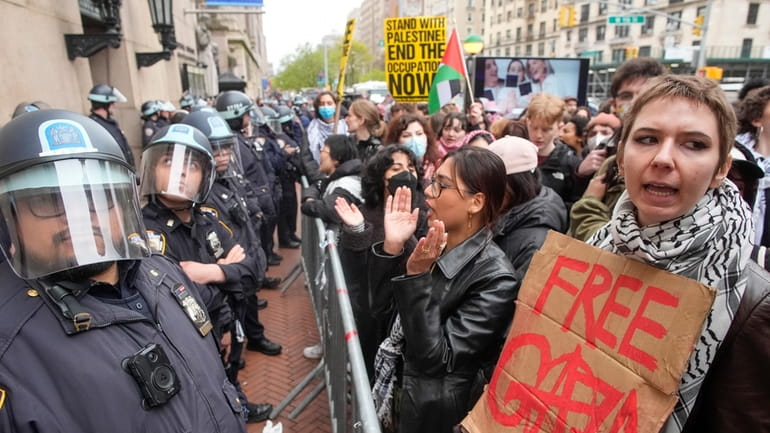Hard lessons in free speech at Columbia University

Police in Riot gear stand guard as demonstrators chant slogans outside the Columbia University campus, Thursday, April 18, 2024, in New York. The protesters were calling for the school to divest from corporations they claim profit from the war in the Middle East. Credit: AP/Mary Altaffer
Columbia University is experiencing many hard lessons about academic freedom, intolerance, freedom of speech, and the disturbing antisemitism that can exist in the most esteemed academic institutions.
At Columbia and other schools, the legitimate exercise of free speech concerning the Israel-Hamas conflict has been marred by disturbing intimidation and aggression. For several days, NYPD officers have lined the streets outside Columbia’s gates and on Thursday arrested more than 100 who had set up an encampment.
It’s clear there is much to be learned about vigorously discussing ideas without denigrating and bullying those holding contrary positions.
On Monday, the 269-year-old university announced it would hold classes remotely, rather than in person, after a weekend of intense anti-Israel protests created security concerns. Columbia president Minouche Shafik acknowledged that there had been too many examples of “intimidating and harassing behavior on our campus.” She pleaded for a “reset” so that cooler heads could prevail.
Columbia officials expressed concern that Jewish students on campus have felt singled out by pro-Palestinian protesters in a threatening and bigoted way. “Antisemitic language, like any other language that is used to hurt and frighten people, is unacceptable and appropriate action will be taken,” Shafik said in her email to students and faculty.
Most protests have expressed anger about the estimated 33,000 Palestinian lives lost in Gaza as a result of Israel’s military response to the surprise Oct. 7 Hamas attack inside Israel that killed more than 1,100 Israelis and foreign nationals. Protesters have often criticized the Israeli government, particularly Prime Minister Benjamin Netanyahu, for killing civilians in Gaza. Few protests have addressed the horrifying Oct. 7 attack and the ongoing fate of some 130 hostages yet to be released by Hamas.
Last week in a congressional hearing, Shafik faced a firing line of questions about antisemitism designed more to drive political wedges than illuminate the complex issues of when and where bedrock principles of free speech must be curtailed for safety. In her answers, Shafik seemed to successfully balance the constitutional rights of faculty and students to express themselves against war policies, while also taking a firm stance against antisemitic hate speech on her campus.
Unfortunately, her testimony seemed to fuel already simmering tensions on her own campus, erupting in this weekend’s demonstrations and a series of troubling physical and verbal threats to Jewish students by pro-Palestinian protesters. On Monday, similar Ivy League protests resulted in 47 arrests at Yale and the temporary closing of Harvard Yard because of security concerns.
Ivy League schools like Columbia have a long history of political protest, notably demonstrations against the Vietnam War where 700 protesters were arrested on campus in one day in 1968. But the interjection of religious bigotry against Jews in this current debate about the Israel-Hamas conflict is unacceptable behavior on any campus.
MEMBERS OF THE EDITORIAL BOARD are experienced journalists who offer reasoned opinions, based on facts, to encourage informed debate about the issues facing our community.
